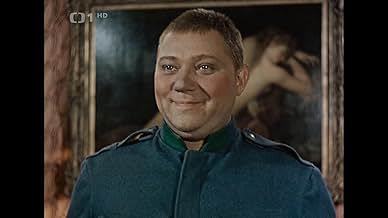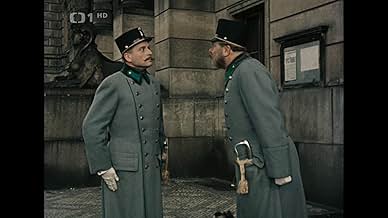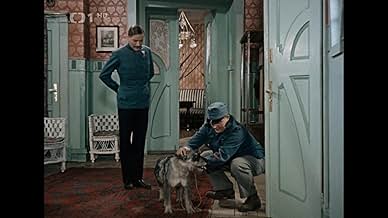Dobrý voják Svejk
- 1957
- 1h 48m
Mrs Müllerova (E. Svobodova) informs her tenant Svejk (R. Hrusinsky) about the recent assassination of Archduke Ferdinand. Svejk heads out to the local pub unaware that a secret police agent... Read allMrs Müllerova (E. Svobodova) informs her tenant Svejk (R. Hrusinsky) about the recent assassination of Archduke Ferdinand. Svejk heads out to the local pub unaware that a secret police agent is also in there spying on people who talk about political subjects. After foolishly talk... Read allMrs Müllerova (E. Svobodova) informs her tenant Svejk (R. Hrusinsky) about the recent assassination of Archduke Ferdinand. Svejk heads out to the local pub unaware that a secret police agent is also in there spying on people who talk about political subjects. After foolishly talking to the agent Svejk gets arrested for treason but soon after gets released on the accou... Read all
- Awards
- 1 nomination total
- Vojenský sluha
- (as Milan M. Homola)
- Director
- Writers
- All cast & crew
- Production, box office & more at IMDbPro
Storyline
Did you know
- TriviaThe Good Soldier Schweik (Czech: Dobrý voják Svejk) is a 1956 Czechoslovak anti-war comedy based on the novel The Good Soldier Svejk by Jaroslav Hasek published in 1923. It was followed by a 1957 sequel I Dutifully Report (Czech: Poslusne hlásím).
- Quotes
[last lines]
Josef Svejk: Herr Oberleutnant! I'm so awfully happy! There is nothing more beautiful than falling in battle for the Kaiser, and his family!
- Alternate versionsThere are at least two versions of the movie. The older Národní filmový archiv (NFA) version featured on DVD and most TV broadcasts does not include the text "Sarajevo 1914" as the first sequence and lacks a movie title at the beginning. The digitally restored version from 2016 features an introduction taken from the theatrical version, with "Sarajevo 1914" in the first sequence and the movie title appearing within the first few seconds. The most noticeable difference is that in the 2016 remastered version there are quite a few scenes with completely different takes used compared to the older Národní filmový archiv (NFA) version.
- ConnectionsFeatured in Fejezetek a film történetéböl: A cseh új hullám (1990)
So, the pros: 1. The script - and although the picture almost verbatim quotes the original source (or rather the first part of it), it does not annoy. We are shown Prague before the outbreak of the First World War and its first months. In the center of the story, Josef Schweik is a Czech idiot and speculator who rushes to the front in the name of the emperor. And then she took off. The book itself ridicules militarism and strongly mocks the foundations of the Austro-Hungarian Empire. And all this is twisted around the personality of an idiot (by the way, this is not an insult, but a medical fact) A Schweik who gets into different situations. And since there is a second part of "Schweik at the front", the picture ends with a hint of a sequel, which was released in the same 1957.
2. The main character - Schweik in the picture looks much more interesting and funnier than in the book, in which he caused only irritation. It should be recognized that the whole picture is drawn by Schweik in a good performance by Rudolf Grushinsky, who looks very similar to the book Schweik with illustrations by Josef Lada. Grushinsky looks just cute and funny, and has not yet managed to do the deeds from the second part of the book, so it's nice to watch.
3. Atmosphere - the creators managed to recreate the atmosphere of Prague at the beginning of the First World War without using expensive tools: full-scale shooting in Prague, several rooms with suitable furnishings and of course costumes with special attention to the military uniforms of the Austro-Hungarian Imperial Army.
There is also good music in the picture.
So, the cons: 1. Humor - for a picture in the genre of "comedy" there are no jokes at all, from the word at all. There is satire, there are funny situations (which will not even make you smile), there is ridicule of militarism, but there is no humor. I don't know, maybe in the late fifties the audience laughed at this, but now it doesn't even cause a smile. Although the great Chaplin created even earlier, but you can laugh at his paintings and laugh again, because there was humor there. So it's about the screenwriters who couldn't cope with the task of making the viewer laugh. For "comedy" this circumstance is a significant minus.
2. The absence of a single funny episode - there is only one funny episode in the book that really works, because this is a dialogue between Schweik and a "fake" officer, whose hero serves as an orderly. This is a dialogue for several pages, but how wonderful it is. This is in the first half of the book, and it is this dialogue that is not in the film adaptation? Are you kidding me?
3. Boredom - the picture is simply boring to watch, even despite the presence of funny moments. Even the large volume of events that were taken from the book does not save from boredom. It turns out that looking at the ceiling can be extremely useful. It's boring, despite the hour-and-a-half chronometers (I watched the black-and-white Soviet version from Lenfilm, in which they cut out a little over ten minutes).
A little about the main characters: 1. Joseph Schweik, played by Rudolf Grushinsky, is a Prague speculator, a clinical idiot, who is destined for a very interesting life full of adventures, because by his behavior he puts everyone around him in a stupor. I have already praised Rudolf Grushinsky, so I see no point in repeating this whole tirade.
2. Katz, played by Milos Kopetsky, is a military priest of the Catholic Church, for whom Schweik serves as an orderly. Likes to drink and "fool around". This character ridicules the image of the clergy, and the actor coped with the role.
3. Lieutenant Lukash, played by Svatopluk Kopetsky, is an officer of the Austro-Hungarian Imperial Army, for whom Schweik serves as an orderly. Behaves arrogantly, sometimes getting into various unpleasant situations because of this. This character ridicules the officer aristocracy of that time.
I liked the picture more than the book (which is not surprising), but I will not watch the sequel, because, remembering the original book source, I do not want to spoil myself and even more so your mood.
What can I say, summing up a certain result. Schweik will still be screened, especially in the Czech Republic, because this is how they glorify their compatriot Yaroslav Hasek - who is known all over the world. And what else is left for the Czechs? Do you know any other famous Czech writers besides Jaroslav Hasek and Karel Chapek? I'm not, maybe because there are no more of them? Well, let them film it, I don't like the book, and I urge you not to even touch it, and even more so not to read this long and boring burden. If you want to read on anti-war topics, then read Remarque or Hemingway, they wrote much better, and most importantly - their books are finished, and Schweik will never be finished.
As a result, we have an average lousy film adaptation, with good moments, a competent atmosphere, a funny main character and good acting.
My rating is 5 out of 10 and I do not recommend this picture for viewing!
- lyubitelfilmov
- Feb 16, 2022
- Permalink
- How long is The Good Soldier Schweik?Powered by Alexa
Details
- Release date
- Country of origin
- Language
- Also known as
- The Good Soldier Schweik
- Production company
- See more company credits at IMDbPro
Contribute to this page






























